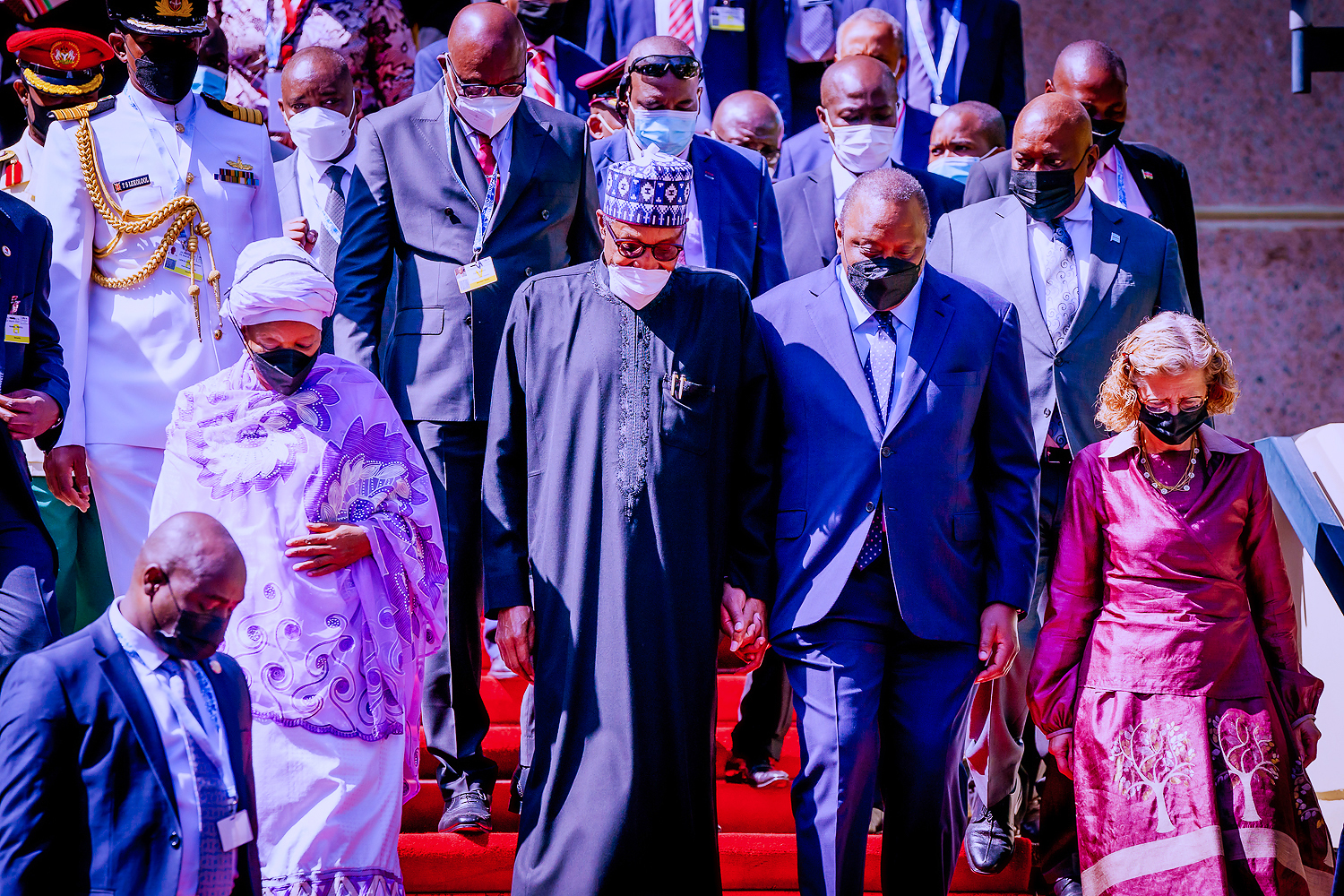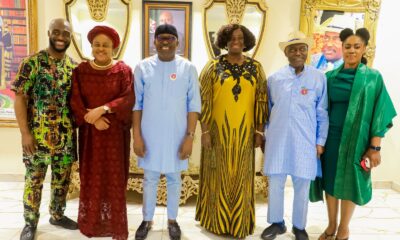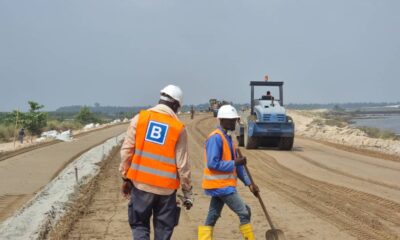Editorial
Supporting The Visually-Impaired

The United Nations has set aside today, January 4, to mark World Braille Day to generate awareness of the importance of braille as a means of communication in the full realisation of human rights for blind and partially impaired persons. Many individuals benefit from braille and the access it provides. This includes those with visual impairments, severe disabilities, and dual sensory loss.
World Braille Day is observed every year on January 4 because it is Louis Braille’s birthday. He is the inventor of braille. Louis was born in 1809 in France and became blind after a childhood accident. But he quickly mastered his new way of living. When he was only 15 years old, he created a reading and writing system based on Charles Barbier’s night writing technique. We know Louis’ system today as braille. Adjusted over time, braille is now easier to read and used all over the world.
There is no gainsaying that people who are blind are excellently endowed, and their potentials need to be channelled towards societal and economic growth. According to the UN, braille is a tactile representation of alphabetic and numerical symbols using six dots to represent each letter and number, and even musical, mathematical, and scientific symbols.
The equipment enables blind and partially sighted people to read the same books and documents as those printed in the visual font. While reading is difficult for some full-sighted individuals, we can only imagine the extra effort required of a visually-impaired person towards comprehending the content of any written document.
World Braille Day is a reminder of the importance of accessibility and independence for blind people. Today’s reality is that many establishments such as restaurants, banks, and hospitals do not offer braille versions of their print materials like menus, statements, and bills. Because of this, people with blindness often do not have the freedom to choose a meal on their own or keep their finances private.
Through World Braille Day, people campaign for braille to be made available globally so that everyone can benefit from this simple but powerful literacy tool. They want governments worldwide to recognise the device as a fundamental human right that allows the blind to make their mark on society just like everyone else.
In a statement to mark the first-ever official World Braille Day, aimed to underscore the primacy of written language for human rights, the UN has estimated that about 39 million people are blind globally, while another 1.3 billion people live with some form of near vision impairment. For them, according to the global body, braille provides a tactical representation of alphabetic and numerical symbols.
As Nigeria joins the rest of the world to commemorate the day, there is a necessity for public and private educational institutions to make braille devices available to blind students. Non-Governmental Organisations, and faith-based groups, among others, should lead a coalition to ensure that blind people have the required braille tools.
Nigerian governments at all levels should ensure that qualified individuals with visual impairment are consulted to formulate and implement policies that would help to improve lives. This effort should be made with the Nigeria Association for the Blind. Steps should be taken to help blind people to adjust to life, training them to be independent through ICT, transcription braille and typewriting lessons.
In the light of this year’s forthcoming general elections and population census, we call for pragmatic and inclusive initiatives and policies that factor in the ability of blind persons across Nigeria to participate fully in the processes. We urge the government at all tiers to do everything humanly possible to ensure that the blind are given equal opportunities as their counterparts with clear visions.
We challenge all in authority to make adequate provisions, including budgetary allocations, to address the concerns of the blind in our midst. Going forward from 2023, we expect a standard and sustained policy of inclusion that accommodates all Nigerians, irrespective of religion or political leanings. This is one of the ways to make the world a better place for all and thereby leave no one behind in all facets of human endeavours.
The post-COVID-19 realities have made things more difficult for all, but the hardship is even more pronounced among persons with visual impairment. Employers of labour, organisations and entities have to create equal, safe and inclusive job opportunities for the visually-impaired and equally render support by training and rehabilitating the blind so that they can also emerge and be productive in life.
Again, the relevant authorities should provide free education for them from primary to university level and also the Persons With Disability Bill should be passed so that it can become a law that will protect their interest and welfare. Furthermore, a National Disabilities Commission should be created to take care of their needs. An environment that can aid them live life with minimal assistance should be created.
Access to information and education is a right and not a privilege. Therefore, the needs of the blind must be considered when producing public documents and educational materials, including programmes of events during public gatherings. Braille production centres should be established in the country to produce materials for such people.
Editorial
A New Dawn For Rivers’ Workers

Workers in the Rivers State civil service have been eulogising Governor Siminalayi Fubara for delivering on his promise to implement a new minimum wage of N85,000, which was reflected in the salaries paid for November. This increase is N15,000 higher than the national minimum wage of N70,000. This represents not only an enhancement in the financial welfare of civil servants but also a recognition of their hard work and dedication to public service. The raise has been met with widespread jubilation among the workforce, who have long advocated for a better wage to cope with rising living costs and economic challenges.
As the news spread, offices filled with laughter and sigh of relief, as employees exchanged stories of how this financial boost would positively impact their families and dependants. The new minimum wage is not just a number; it symbolises the government’s commitment to improving the standards of living for civil servants and fostering a more equitable workforce. Many workers expressed their gratitude for the governor’s timely intervention, highlighting how important it is for public servants to feel valued and adequately renumerated.
Governor Fubara’s decision is expected to reinforce morale within the civil service, fostering greater productivity and dedication among employees who contribute significantly to the state’s development. With the new wage in place, there is a renewed sense of optimism among civil servants, who now feel more empowered to serve the government and the citizens with greater enthusiasm and commitment.
The Governor had declared an increase in salaries for state workers, emphasising that this adjustment is not only a reflection of the government’s commitment to improving the welfare of its employees but also a strategic move fueled by the state’s enhanced Internally Generated Revenue (IGR). He assured workers that the financial backing for this increment is sustainable, stemming from the state’s focused efforts to bolster revenue through various initiatives, including tax reforms and enhanced efficiency in public service delivery.
Furthermore, the governor’s promise of funding the increment solely through increased IGR signifies a commitment to fiscal responsibility and transparency. It reassures the people that the government is proactively managing resources while investing in their future. As the state continues to explore opportunities for revenue enhancement, Fubara’s administration remains focused on ensuring that these initiatives translate into tangible benefits for the workforce, ultimately fostering a more motivated and dedicated public sector.
The decision by Fubara to be the first in Nigeria to implement the new national minimum wage is a commendable step that reflects a proactive approach to governance and an understanding of the pressing needs of the workforce. In an economy where many families struggle to make ends meet, especially in the face of rising living costs, this enterprise will improve the quality of life for workers and also set a precedent for other states to follow.
In recognising the various drives and support provided by Fubara’s government, it is necessary that the workers reciprocate by embodying a spirit of productivity and commitment to the current administration’s goals. They should align their daily operations with the administration’s objectives to enhance effectiveness and foster an environment of collaboration and trust. This reciprocal relationship can lead to innovative solutions and efficient service delivery, ultimately benefiting the state and strengthening public trust in government institutions.
Surprisingly, despite the political challenges the government has been navigating, alongside the myriad of ambitious projects it is embarking on, it has managed to raise funds to implement a minimum wage of N85,000 This achievement reflects a commendable level of resilience and resourcefulness within the government’s fiscal strategies. In a nation often marred by economic volatility and political discord, finding a way to sustain and even elevate the livelihoods of its employees is no small feat.
Workers in the state have truly found themselves in a remarkably advantageous position under this administration, especially when compared to the previous regime. The immediate past government’s blatant refusal to implement the minimum wage of N30,000 left many employees disheartened and struggling to meet their basic needs. What was even more disconcerting was the absence of meaningful negotiations with labour representatives, leaving workers feeling unheard and undervalued. In contrast, the present administration has prioritised dialogue and engagement with labour unions, recognising the importance of fair wage for workers’ contributions to the state’s economy.
With the current government’s commitment to improving wages and working conditions, it is clear that a major shift has taken place. This renewed focus on the welfare of workers empowers them and instils a sense of hope and optimism for the future, as they can now look forward to a more equitable and supportive work environment. Ultimately, the ongoing trajectory suggests a promising era for labour relations in the state, one where workers are valued and their rights upheld.
Siminalayi Fubara has consistently demonstrated his dedication to workers’ welfare since taking office in May last year. Unlike his predecessor, who left many employees feeling overlooked and unsupported, Fubara wasted no time in addressing the longstanding stagnation of promotions that had plagued the workforce for eight years. He took further steps towards financial justice by initiating the long-overdue payment of gratuities that were neglected during the last administration.
Similarly, we urge the governor to take another step forward by reviewing the stipends received by pensioners. The current pension amounts have become woefully inadequate, leaving many of them who dedicated their lives to public service struggling to make ends meet. These dedicated individuals who have contributed to the development of our dear state now find themselves in a precarious financial situation, receiving stipends that are alarmingly low and insufficient to cover basic living expenses. The rising cost of living has rendered their pensions nearly meaningless. Therefore, a comprehensive reevaluation of these stipends is a required measure to ensure that those who have served our state with honour can live their remaining years with dignity and security.
Editorial
Another Look At Contributory Pension Scheme

In a report from the National Pension Commission (PenCom), it was disclosed that only 26 states in Ni-
geria have implemented the Contributory Pension Scheme (CPS), two decades after the Pension Reform Act (PRA) 2004 was passed. The report highlights the inconsistent espousal of the CPS across states, with some states partially adopting the scheme, others not yet participating, and some facing challenges in getting the bill approved in their state legislative assemblies.
In 2012, the Rivers State Government, under the leadership of former Governor Chibuike Rotimi Amaechi, embarked on a critical initiative by enforcing the Contributory Pension Scheme. This strategic move aimed to establish a sustainable pension system by requiring contributions from both the employer and the employee. The arrangement was designed to ensure that employees have a secured and reliable source of income post-retirement, fostering financial security and stability for the workforce.
Following the introduction of the plan, the government adopted a three-year transition that aimed to fully implement the scheme by 2015. During this transition period, the authorities focused on educating both employers and employees about the benefits and responsibilities of the CPS. This included workshops, seminars, and public awareness campaigns to ensure that all stakeholders were well-informed about the scheme.
The creation of the CPS represents an important milestone in the ongoing efforts to overhaul and enhance the state’s pension system, aiming to establish a more robust and secure retirement savings framework for its workforce. The primary objectives of the CPS are to effectively tackle the inherent shortcomings of the former pension system, including limited coverage, insufficient benefits, and financial uncertainty. This strategic framework is designed to ensure that employees receive sustainable and dependable retirement benefits.
However, to ensure fairness and protect the rights of all workers, it is imperative that the effective date of the contributory pension law be prospective, applying only to workers hired in or after 2012. This would allow those employed before 2012 to continue to benefit from the provisions of theDefined Benefit Scheme (DBS), while ensuring that new hirees are subject to the updated pension provisions.
Unfortunately, the pension programme has experienced several challenges. Despite monthly deductions being taken from civil servants’ salaries for their counterpart funding, the government has not fulfilled its obligation to contribute its share. This has impeded the advancement of the scheme and has left many civil servants without sufficient pension arrangements upon retirement.
As a result, the state pension law has undergone multiple revisions to address the issue of retiring civil servants who ordinarily should be covered by the contributory scheme. The amendments have aimed to accommodate these individuals within the DBS which provides a guaranteed level of pension, based on years of service and salary grade level.
The inability of the contributory pension scheme to gain traction has sparked worries about the long-term viability of the state pension system. The absence of government contributions has resulted in a funding shortfall that jeopardises the government’s capacity to fulfil its pension commitments to employees in the future.
Even if the CPS was created to address the perceived shortcomings and lack of sufficient funding of the DBS by combining funds from employers and employees’ contributions to pension funds custodians, retirees under the scheme have not experienced better outcomes than those who retired under the DBS. On the contrary, the execution of the CPS is different from what its advocates led employees to expect.
The complaints regarding the implementation of the CPS are varied and concerning. Retirees are underpaid despite years of dedicated service, with some having served for the mandatory 35 years. Corruption is rampant within the system, and many state governments and employers are not complying with the provisions of the Reform Act, 2014. Labour leaders in the country have criticised the scheme as being anti-workers and retirees welfare. The Association of Senior Civil Servants of Nigeria (ASCSN) has even called for the scheme to be scrapped, labelling it as a “huge fraud.”
Similarly, we urge the Rivers State Governor, Siminalayi Fubara, to completely abolish the contributory pension scheme in the state, as it will not benefit civil servants. We are particularly concerned about the future of workers who will retire under this scheme, especially since the current legislation allowing for the Defined Benefit Scheme will be obsolete in June next year, when the contributory pension law will be effective.
Moreover, the state government is deducting and remitting workers’ contributions to the pension scheme, but failing to contribute their own counterpart funds as required by law. This action is a violation of the rights of contributors as outlined in section 4(1) of the Pension Reform Act 2014. According to this section, employers are mandated to contribute a minimum of 10 per cent of an employee’s monthly salary to their pension fund administrators. Employers are also required to deduct a minimum of eight per cent from the employee’s salary and remit it to the fund administrator.
A government that supports labour rights, like the current one, should not allow workers to suffer from a failed retirement scheme. Workers who are close to retirement age should not have to face unnecessary challenges. The failure of the scheme is evident from the number of agencies that have withdrawn from it. Therefore, it is important for the state leadership to revoke the legislation.
Unlike previous administrations that may have disregarded the experiences of workers in the state, the present government has consistently recognised and appreciated their contributions. The labour-friendly policies of this government have shown its dedication to the well-being of workers. However, the failed retirement scheme remains a critical issue that needs to be addressed.
Editorial
Making Rivers Investment Destination

Determined to make a difference in governance, Rivers State Governor, Sir Siminalayi Fubara, has signed an Executive Order aimed at the establishment of an investment agency. This initiative is poised to coordinate the growing number of enquiries and business interests expressed by local and foreign investors who now consider the state a destination of first choice. The Governor has endorsed Executive Order No. 002 of 2024, establishing the Rivers State Investment Promotion Agency (RIPA), presented by the Attorney General and Commissioner for Justice, Dagogo Israel Iboroma, SAN.
The Governor explained that what he had just done was to give force to one of the recommendations in the report submitted to him by the committee that handled the organisation of the Rivers State Economic and Investment Summit in May. He said it was undisputed that the summit served as a veritable platform to open up the state for economic advancement, adding that the Investment Promotion Agency would be a one-stop shop to handle all related activities seamlessly in the state.
Fubara said: “This will enable investors, when they come in; they won’t need to run around, and maybe, fall into wrong hands or associations that will want to rip them off their investment stakes. With this, they will have an agency that they could go to, liaise with and the agency will have the required answers to whatever it is that they will need to address concerns before it.”
It is common knowledge that Rivers State is rich in natural resources and has a thriving economy primarily driven by oil and gas. However, beyond these industries, there is an abundance of other untapped opportunities in agriculture, tourism, and technology. Yet, despite its wealth of resources, the state has faced numerous challenges such as infrastructural deficits, poor governance in the past, and an economy heavily reliant on oil. As a result, diversifying the economy has become obligatory.
This development is a significant step towards making Rivers State a premier investment destination, with the Agency expected to play a critical role in attracting and retaining businesses, creating jobs, and driving economic growth. Fubara’s action points to the fact that beyond organising the summit, his administration can live up to fulfilling its promise of making Rivers State great again, economically. Any wonder the Governor stated he was not going to end with the signing of the Executive Order alone but would drive it to a conclusive end to achieve the desired fulfilment that Rivers people expected.
The recent inauguration of RIPA’s board marks a watershed moment in the state’s economic trajectory. Fubara’s decision to set up the Agency reflects his administration’s commitment to reversing the economic decline that has plagued the state for years. By appointing a new board, the government aims to inject fresh ideas and perspectives into the establishment, promoting a culture of transparency, efficiency, and accountability.
Entrepreneurial drive is strong in our state, leading to the daily rise of small-scale enterprises and new entrepreneurs. In today’s world, aspiring business owners frequently face challenges like insufficient funding, limited access to information about available resources, bureaucratic obstacles, and a lack of supportive government policies. The current administration should acknowledge these challenges and be dedicated to stimulating a favourable investment climate.
While the Governor’s vision and the Agency’s efforts are critical, achieving sustainable economic transformation will require collective engagement from all stakeholders. The active participation of the community, local businesses, and civil society is essential for the realisation of these goals. Community involvement is pivotal in ensuring that the needs and aspirations of the populace are integrated into the economic policies and initiatives. Creating avenues for public participation not only empowers citizens but also nurtures a shared sense of responsibility towards the development of the state.
The role of the media cannot be understated in this collective effort. The media serves as a watchdog and an informer, ensuring that the government remains accountable and that citizens are aware of opportunities and challenges in the economic landscape. As with any ambitious vision, several challenges may impede the speed to economic transformation in the state. These challenges must be acknowledged and addressed to ensure that progress is sustainable. The government, alongside the Agency, must proactively identify the barriers and develop strategic solutions.
Corruption remains a vital hurdle in many sectors in Nigeria, and Rivers State is no exception. To combat this, the government must demonstrate unwavering commitment to transparency and accountability, ensuring that funds allocated for development are utilised effectively. Also, the state must prioritise infrastructure development, which is foundational to economic growth. By investing in modern infrastructure, the government can lay the groundwork for enhanced productivity and attract local and foreign investors, nourishing an environment conducive to economic development.
Fostering partnerships with international organisations and development agencies can provide valuable resources and expertise. Such partnerships can facilitate technology transfer, capacity building, and investment opportunities that enrich the local economy. Furthermore, the message of economic transformation must be communicated to all residents of the state. Building awareness and consensus around the vision for the state will galvanise support and encourage collective participation in the transformation endeavour.
Undeniably, Fubara’s leadership and vision have given Rivers people hope for a better economic future and his initiative has put the state on the path to realising its full potential. Its commitment to creating an investment-friendly environment is necessary to attract investors and stimulate economic growth. RIPA’s mandate to return Rivers State to its rightful place as an economically viable entity is a challenge that requires collective effort and support.
-

 News1 day ago
News1 day agoNigeria Has No Reason To Be Poor – Ooni
-

 News1 day ago
News1 day agoIN RIVERS, GOD REMAINS OUR ULTIMATE LIBERATOR – FUBARA
-

 News1 day ago
News1 day agoCHRISTMAS: FUBARA, WIFE HOST RIVERS CHILDREN, TASK THEM ON EXEMPLARY CONDUCT
-

 Nation4 days ago
Nation4 days agoBodo-Bonny Road: Julius Berger Workforce Maintains Steady Work to ensure timely delivery
-

 News1 day ago
News1 day agoFUBARA MOURNS FORMER RIVERS GOV
-

 Transport2 days ago
Transport2 days ago‘Poor State Of Road Affecting Onne Port’s Operations’
-

 News1 day ago
News1 day agoMayor Of Housing Wins Man Of The Year Award
-

 News1 day ago
News1 day agoArmy Destroys 20 Illegal Refineries, Arrests Eight In N’Delta

